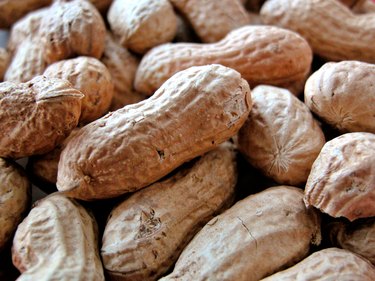
Raw foods proponents sing the nutritional praises of their strict diets, claiming that you'll experience optimal nutrition and better digestion when you don't heat foods above 116-degrees Fahrenheit. Raw nuts are an intrinsic part of a raw food diet because they provide protein, healthy fats and essential minerals. Peanuts don't fall into this category, however, because they are legumes, not nuts. Commercial peanut butter, even natural and organic varieties, are made with roasted peanuts -- meaning peanut butter isn't a raw food. Depending on the strictness of your raw diet, though, you may still include peanut butter occasionally.
The Gist of the Raw Diet
Video of the Day
A raw food diet consists mainly of uncooked plant foods, including nuts, seeds, fruits, berries, vegetables and cold-pressed oils. Very few people follow a raw diet 100 percent of the time. Eating 75 to 80 percent of your foods raw qualifies you as a raw foodist. This allows for occasional meals out or the periodic treat of a cooked food, such as peanut butter.
Video of the Day
Peanut Butter Processing
Although the ingredient list for most peanut butters is relatively short, the food is highly processed -- something a raw food diet seeks to avoid. To make peanut butter, the nuts are harvested, de-shelled, roasted, skinned, sorted and then pulverized into a paste, often with extra oil, salt and sugar. A food that has gone through this much activity after harvest is no longer considered "living."
Raw Peanut Warning
You could technically make raw peanut butter in a high-speed blender or food processor. Quality, uncontaminated raw peanuts, though, are hard to find. Peanuts are highly susceptible to contamination by Aspergillus flavus, which produces aflatoxin, a toxic metabolite that can cause illness. Making raw peanut butter increases your risk of exposure to this toxin. Small amounts from occasional indulgences are unlikely to do you any harm, but eat raw peanuts as a staple of your raw food diet and you risk overexposure. Raw peanuts also have a relatively short shelf life and quickly become rancid.
Peanut Alternatives
Raw cashew and almond butter is readily available in specialty markets and some grocery stores. Cashew butter is rich in the minerals copper, manganese, magnesium and phosphorus. Almond butter has a significant dose of vitamin E, along with calcium, potassium and iron. Another safe, raw alternative to peanut butter is raw tahini, made from ground sesame seeds. Tahini may not be the best choice for a PB and J, but it will stand in for peanut butter in sauces and salad dressings.